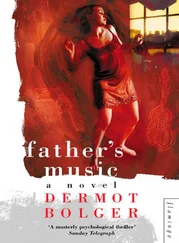Dermot Bolger - The Woman’s Daughter
Здесь есть возможность читать онлайн «Dermot Bolger - The Woman’s Daughter» — ознакомительный отрывок электронной книги совершенно бесплатно, а после прочтения отрывка купить полную версию. В некоторых случаях можно слушать аудио, скачать через торрент в формате fb2 и присутствует краткое содержание. Жанр: unrecognised, на английском языке. Описание произведения, (предисловие) а так же отзывы посетителей доступны на портале библиотеки ЛибКат.
- Название:The Woman’s Daughter
- Автор:
- Жанр:
- Год:неизвестен
- ISBN:нет данных
- Рейтинг книги:4 / 5. Голосов: 1
-
Избранное:Добавить в избранное
- Отзывы:
-
Ваша оценка:
- 80
- 1
- 2
- 3
- 4
- 5
The Woman’s Daughter: краткое содержание, описание и аннотация
Предлагаем к чтению аннотацию, описание, краткое содержание или предисловие (зависит от того, что написал сам автор книги «The Woman’s Daughter»). Если вы не нашли необходимую информацию о книге — напишите в комментариях, мы постараемся отыскать её.
The Woman’s Daughter — читать онлайн ознакомительный отрывок
Ниже представлен текст книги, разбитый по страницам. Система сохранения места последней прочитанной страницы, позволяет с удобством читать онлайн бесплатно книгу «The Woman’s Daughter», без необходимости каждый раз заново искать на чём Вы остановились. Поставьте закладку, и сможете в любой момент перейти на страницу, на которой закончили чтение.
Интервал:
Закладка:
The single candle is stuck with wax on to the top of the chipped dresser. Its small flame lengthens and draws in the shadows along the walls of the room. They lie curled together against the cool sheet below and the rough warmth of blankets above, her feet drawn up into his stomach as she allows him to peel each nail of her toes, just the scratch of nail cutting through nail filling the silence. Then the light clicks in their father’s room and they pause for a few moments before they tentatively begin.
The blankets are tossed down below their knees, her nightdress slipped up above her head. His hand stroking across her thigh, he suppresses her giggles with his lips. Both close their eyes, retreat into their separate illicit fantasies – her husband coming home to her from work – he draws her hand down to the rigid penis – his own girl in a doorway down the dark side entrance of the Casino – where the first light hairs cluster around its base. Stiff with the thrill of fear and excitement they lie, afraid to creak the bed springs, until he grimaces in his cramped position, his mouth pushed into her hair to stifle the panting as his limbs overspill with pleasure.
She watches the white stains settle over her naked stomach, feels his body relax as he turns and drifts towards sleep. The cloth is tucked beneath the mattress, she shivers as she wipes herself, the husband’s knock, his bicycle ticking down towards the shed, the first kiss on her lips in the sparkling kitchen, all gone, all gone.
We were in a classroom in the cellars of the church, down a granite flight of steps. The windows had thick hammered panes of glass and so the light had to be left on all day. Every morning I was sent up to the big school with another girl to fetch the crate of Government milk. We’d feel so important that last year to be let out alone, walking through the scraps of bread after break in the concrete yard where the seagulls swooped and clawed at each other. In winter the milk would often freeze, and when you raised the half pint to your lips you’d suddenly swallow raw chunks of ice.
Miss O’Flynn frequently switched into Irish and the whole class would keep our heads down because we couldn’t understand what was being said. The times I loved best were the singing lessons, when she would unzip the small fur-lined bag and produce her green-and-cream Melodica with keys like a miniature piano. She’d blow the dust from it with a single shrill note and arrange us in rows against the back wall to accompany us through every hymn in our song book, Mother of Christ, Star of the sea, Pray for the wanderer, Pray for me. Those lovely and lonely words sung over and over to her methodic accompaniment till we had them perfect. I felt such joy and safety in being part of a group, a unified voice wafting up into the church where I imagined the women who had come to pray were listening to our singing coming faintly through the floor.
At three o’clock when the bell rang the class would burst out into the tiny passageway, fighting to be the first to crest the stone steps before scattering off in every direction. I would delay until I thought nobody was watching and then slip through the ornate wooden doors of the church. In the porch a stone staircase twisted upward like in a castle to the high balcony where the choir sat. Beside it a wire rack displayed small pamphlets on the lives of the saints and the dangers of marriage outside the fold. Just inside the inner doors there were two small altars with statues and a twisting metal candlestand. Old women always knelt there, whispering loud indistinguishable prayers.
I’d genuflect with my head covered and walk to the top of the church where the two side aisles were always empty. The left one would be drowned in deep shadows and the right transfixed by afternoon light igniting the coloured squares of stained glass.
All alone in that mesh of light I’d pray, trying to recapture the holiness and union with God that I once used to feel. But though I tried to prevent them, my eyes would always stray up towards those white marble limbs of the crucified Saviour on his cross that would remind me of Johnny’s ivory white body against mine in those sessions I had failed to end, and the shame and guilt would rush in.
Those blood-stained eyes stared mournfully down at me from beneath the crown of thorns as I knelt, tiny and insignificant, in the third row from the end, and I knew that unless I confessed my soul was damned. Yet every fortnight when I entered that black box with rows of impatient classmates waiting outside and Miss O’Flynn overseeing it all, how could I begin to tell the bored voice on the lit side of the grille the sins of touch from the night-time and the blasphemy of sight on those despairing afternoons? I’d emerge doubly condemned for the sin of false confession, cast out by fear from my second family until Johnny’s was the only company I could still fit within.
johnny johnny hung on the church wall. johnny johnny had a great fall. all the king’s horses turned bright red, when mammy loved johnny johnny in bed. always the same, story the same, school and job, and death and pain. we know every word by heart, but when she leaves our fun will start. frightened by that open door, let in the bogeyman from the stair. must stay quiet, must not speak, till mammy mammy is down the street.
I suppose Johnny was always just weak, although I never recognized it then. A few years later on I remember catching a glimpse of him one night in the National Ballroom in town. We had gone off to see the Clipper Carlton Showband but couldn’t get in, so we’d wound up there without him knowing it. I was standing up near the stage to gaze at the Mighty Avons when I saw him hovering in front of a girl with a stiff beehive, trying to work up the courage to ask her to dance.
He was so slow and obviously nervous that her friends began to giggle in the chairs beside her and she became embarrassed. Then he asked her in a rush and seemed almost relieved when she snubbed him and he could merge back into the crowd as if it had been the high point of his night.
But back when I was eleven or twelve he was a hero because, even though he was bigger, he never looked down on me and I felt important and wanted in his company. Besides, I was at an age to want to know and there was nobody else to tell me things. Poor Johnny, always laughing and joking when we were alone, and then quiet in company like you’d think he was in bad humour till you realized he lacked a single shred of confidence. Always tucked up in the centre of a crowd of lads as if living off their collective bravado. For all his air of knowledge I suppose he knew as little as I did in those days.
Stillness reigns when the key is turned in the lock. The woman’s footsteps turn to descend the stairs, pausing every morning to listen for sounds before the glass rattles in the panel of the front door as it is slammed shut. The noise reverberates through the floorboards up into the dark room where the girl lies, and all the glass there seems to take up the echo and quiver until the very air is vibrating with sound. She never moves from the mattress, but beneath her closed eyelids she can feel the roof descend. Walls advance and begin to spin as the bed springs undulate like a rippling tide. Breathless with excitement, she waits for her friend to visit her.
He calls her name through clanging coat-hangers, there is no danger – she can answer him. He is both older and younger than her. He has no age. He has lived forever. He tears apart all the colours that form black; dissolving reds and blues spin in glowing bands around the room. Nothing there is stationary any longer, he breathes his life into the woodwormed furniture. And nobody can reach her inside that cocoon, she is deaf to the shouts of children playing outside. She never has to warn him when to leave, johnny johnny knows when his time is done. He knows that he can never be forgiven, he knows he must remain her secret lover. Slowly he gathers himself up, softly the bed springs are reined in. Only darkness remains in the room when the girl’s eyes flicker open and the woman’s footsteps come.
Читать дальшеИнтервал:
Закладка:
Похожие книги на «The Woman’s Daughter»
Представляем Вашему вниманию похожие книги на «The Woman’s Daughter» списком для выбора. Мы отобрали схожую по названию и смыслу литературу в надежде предоставить читателям больше вариантов отыскать новые, интересные, ещё непрочитанные произведения.
Обсуждение, отзывы о книге «The Woman’s Daughter» и просто собственные мнения читателей. Оставьте ваши комментарии, напишите, что Вы думаете о произведении, его смысле или главных героях. Укажите что конкретно понравилось, а что нет, и почему Вы так считаете.












